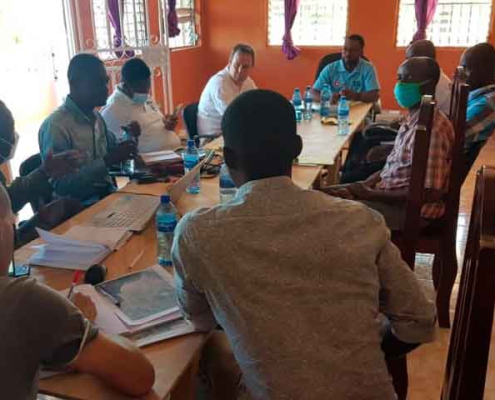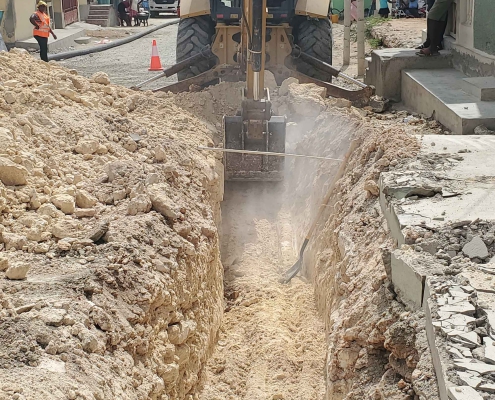Activities 2022

The program has a national scope and is being implemented in the country’s ten departments. By December 2022, it has benefited more than 650,000 people. However, its reach is much greater indirectly, as it has contributed to the institutional strengthening of the National Directorate of Drinking Water and Sanitation (DINEPA) and has promoted the decentralization of the water and sanitation sector to improve management. The objective is that once the program is completed, the Haitian institutions themselves will be personally responsible for the maintenance of the installed systems.
It is also associated with an ambitious infrastructure improvement project in cities such as Hinche, Arcahaie, Cabaret, Cap-Haïtien, and Jérémie, among others. In the second half of 2022, the country experienced a complicated fuel shortage situation, which affected the planning of most of the works. However, work has started on Fort Liberté and resumed on Lot 2 in Cap-Haïtien. Work has also begun at Miragoane, and several companies have signed contracts to begin work at Petit Goave, Saint Louis du Nord, and Limonade. The program will continue to be executed over the next few years and is expected to be completed by the end of 2024.
OTHER PROGRAMS ASSOCIATED WITH THE FUND

Currently, there is a European Union Delegated Cooperation program underway called URBAYITI: Access to essential water and sanitation services, which has a total financing of 4 million euro, of which 1 million corresponds to a donation from Spain, through the Water Fund and 3 million from funds delegated by the EU.
URBAYITI is based on the principle of coordination between donors -AECID and the European Union- and Spain was chosen to manage the project because it has been one of the main donors to the water and sanitation sector in the country in recent years, generating a close relationship with the country’s National Directorate of Drinking Water and Sanitation (DINEPA).
The objective is to strengthen the resilience of cities and urban populations by improving access to essential services and creating the conditions for water supply and sanitation compatible with the integrated development approach in the area. Specifically, work is being done to improve access to essential services in Port-au-Prince, Jérémie, and Les Cayes. It is expected that 7,350 people will benefit from new access to drinking water and approximately 2,000 from sanitation services. The intervention also includes rehabilitating and constructing sanitary blocks in schools, markets, health centers, and other community facilities.
COUNTRY CONTEXT
Haiti is the country that has received the most funds from the FCAS: in total, almost 120 million euro in donations since it is one of the countries with the greatest difficulties in the world in terms of development and economic conditions. Added to this is the political instability experienced since 2019 and the impact of various natural events, such as the 2021 earthquake. In this situation, access to piped water and sanitation is inferior, and only 66.7% of the country’s population has improved water systems.
All the actions carried out by the Water Fund in the country have had a national dimension. The programs have been implemented with the National Water and Sanitation Directorate (DINEPA) participation. The general lines of action of its interventions are as follows: (1) promoting access to drinking water by improving infrastructure and service conditions, (2) promoting sanitation, and (3) strengthening the institutions responsible for managing the resource, with emphasis on decentralization, providing technical training and monitoring and control instruments.

